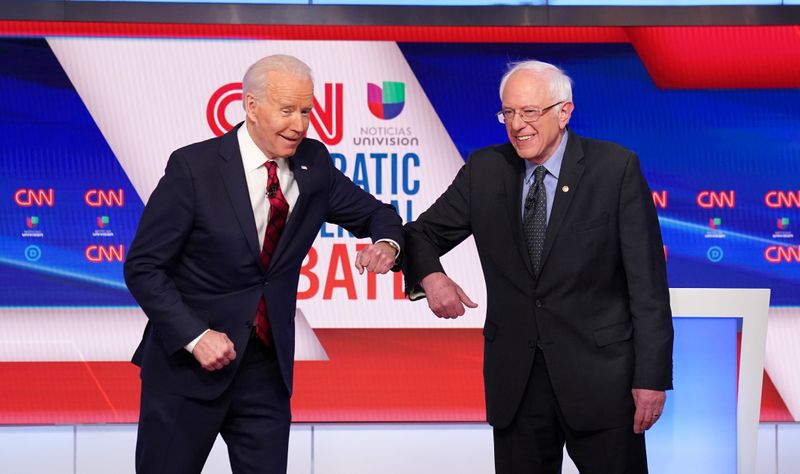By James Oliphant
WASHINGTON (Reuters) - Joe Biden and Bernie Sanders faced off on Sunday in what was possibly the final debate of the 2020 Democratic presidential nominating contest, with their ideological differences laid bare amidst the national crisis over the coronavirus pandemic.
Biden entered the evening leading Sanders in terms of the Democratic delegate count ahead of primaries on Tuesday in Arizona, Florida, Illinois and Ohio that could give him unstoppable momentum barring a last-minute postponement.
The Democratic nominee will face Republican President Donald Trump in the Nov. 3 U.S. general election.
Here are three takeaways from Biden and Sanders’ first one-on-one debate:
BIDEN IN WARTIME
There was a clear tonal difference at the outset between Biden, the former vice president who served two terms under ex-President Barack Obama and Sanders, the Vermont democratic socialist senator who has been a member of Congress for 30 years without serving in leadership.
Asked about the pandemic, Biden adopted a wartime posture, talking about immediate steps he would take as president and frequently referencing the White House Situation Room.
He called for expanding hospital capacity, erecting temporary medical facilities and said unequivocally he would call on the U.S. military to help respond to the outbreak.
"This is like we are being attacked from abroad," he said, also urging Sanders to put their ideological divide aside.
Sanders used the crisis to talk up his Medicare for All platform, saying the threat underscored the need for a government-run healthcare system. He blasted Biden as being beholden to the healthcare and pharmaceutical industries, something the former vice president denied.
Biden fired back that a single-payer system had not worked in Italy, one of the countries hardest hit by coronavirus.
“It has nothing to do with Medicare For All — that would not solve the problem at all. We can take care of that right now by making sure that no one has to pay for treatment period because of the crisis," Biden said.
For anxious Americans watching at home as businesses, schools and restaurants are shuttered, Biden may have offered more direct reassurance than Sanders, who still prefers to talk about events in the context of large-scale reform and far-flung legislation rather than things than can be done right away.
LITTLE UNITY
There had been expectation that the debate, coming during a national emergency, might allow the two Democratic contenders to find some common ground and show a unified front against Trump.
But Sanders seemed uninterested in breaking bread with Biden.
Last week, after getting routed in a spate of primaries in Michigan, Missouri and elsewhere, the progressive firebrand sounded almost conciliatory. He seemed to recognize that Biden was on course for the nomination and appeared intent on ensuring that Biden paid attention to liberal policy priorities.
In recent days, Biden had tried to extend an olive branch to the progressive community, adopting Senator Elizabeth Warren’s bankruptcy reform plan and calling for free public college for families making $125,000 or less.
Sanders appeared unmoved by the gestures. During the debate, he assailed Biden as being insufficiently leftist on issues such as Social Security, abortion and campaign finance. At several instances, Biden stood on stage with his hand in his pocket as Sanders berated him. Throughout, Biden argued that voters want results, not “revolution.”
Going unmentioned for long stretches of the debate: their common adversary, Trump, whose campaign immediately criticized both candidates as advocating an insufficient response to the national health crisis.
LEFT OUT
Biden and Sanders, both of whom served in Congress for decades, sparred at length over their individual records as lawmakers.
The image of two over-70, white males fighting about distinctions in policy likely did little to ease a jittery nation - and perhaps even less to appeal to the young and other nontraditional voters whom the Democratic nominee may need to defeat Trump in November.
Those groups are critical for Sanders, who during the debate conceded that many of his core supporters are not reliable voters. For Biden, it’s more of a calculated risk. His surge in the polls has come from a mix of African-American and older voters, particularly women.
Biden did affirmatively pledge to name a woman as his vice presidential nominee, which may, down the road, help pull in young liberals. He did not directly address a question about his lack of support in recent primaries from Hispanic voters.
Sanders' supporters immediately criticized a comment after the debate by Anita Dunn, a top Biden adviser, who in a call with reporters said: "I think it's fair to say that Vice President Biden showed up to a debate tonight ... graciously dealing with the kind of protester who often shows up at campaign events on live television."

If and when the coronavirus crisis subsides, Biden, should he be the nominee, may have to do more work to attract voters who could feel left behind when Sanders exits the race.